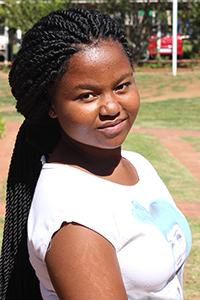
Andiswa Methu, a first-year
BCom Accounting student at
Kovsies and one of the
top-achieving matriculants
in the country.
Photo: Siobhan Canavan
Andiswa Methu will miss her mother, but will work hard to send her first salary to the woman who raised her to stand proud as one of the top-achieving matriculants in the country.
Excited to make new friends at UFS
The 17-year-old Andiswa, from Petrusburg in the Free State where she attended Ipetleng Secondary School, is a first-year student at the University of the Free State in 2017. She is studying BCom Accounting and will become part of the Welwitschia female residence on the Bloemfontein Campus.
Although she was not too keen on moving away from home, Andiswa is excited about making new friends and loves meeting new people. “I’m going to miss my mother so much and I know that this will be a different environment for me, but I’m excited for the journey that lies ahead.”
Working hard to make her mother proud
The first-year, who loves working with numbers, says she will work hard to make her mother, Nozibonelo Methu, proud. “I am going to study accounting,” she says. “My first salary will definitely go to my mother.”